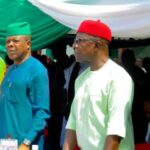By Chukwuma Okoli & Ndu Nwokolo
The youth are a critical stakeholder in Nigeria’s electoral landscape. Their teeming number which accounts for about 70 per cent of Nigeria’s population makes them a force to reckon with. Also, their growing enthusiasm in the electoral process as demonstrated by their recent increased turnout for voter registration makes them an attraction for political parties and contestants. Data released by the Independent National Electoral Commission (INEC) in 2022, following a rigorous clean-up of the voter registration data using the Automated Biometric Identification System (ABIS), show that young people aged 18-34 years accounted for 76.5 percent of the 9,518,188 million newly registered voters in Nigeria. The growing enthusiasm of the youth in the electoral process is connected to a lot of factors such as their desire to change the political system perceived to have exposed them to increasing economic hardship and political marginalisation in the country over the years. What is more, social media has provided a veritable platform for the youth to mobilise and express themselves in the political space. However, the youth have been presented as both perpetrators and victims of violence in Nigeria’s electoral process. Yet, other studies document their role as agents of peacebuilding in the electoral process. Thus, youths are a double-edged sword that can be deployed for violence as well as peacebuilding in the electoral process. This edition of Nextier SPD Policy Weekly assesses the risks of youth participation in the election and Post-election violence and suggests pathways for mitigating such violence through the strategic engagement of the youth ahead of Nigeria’s 2023 general election
YOUTH POLITICAL PARTICIPATION AND ELECTION VIOLENCE IN NIGERIA
Although the youth constitute about 70 per cent of Nigeria’s population and account for over half of registered voters, their participation in politics as contestants and elective office holders is limited by the high cost of elections, exclusionary legal framework, party system, and structural factors such as poverty, unemployment, etc. The prebendal character of politics in Nigeria makes the youth a cheap tool of violence in the hands of political godfathers. The frustration arising from their exclusion not only pushes them to seek violent ways to express their dissatisfaction but also makes them willing tools in the hands of politicians who deploy them to intimidate non-supportive voters, harass political opponents and actualise self-serving political objectives. Young people’s engagement in election violence is usually facilitated by agencies such as cults, gangs, ethnic-nationalist groups, militants, and thug groups which provide platforms for planning, recruiting, mobilising and arming young people for violence during elections.
The history of Nigeria’s elections shows the significant role of youth as perpetrators and victims of election violence. During the 2003 elections, the youth were recruited to perpetrate various forms of electoral violence. In Abia and Anambra States, the then-incumbent governors were alleged to have used the Bakassi Boys to rig elections and protect other political interests. In Rivers State, preparatory to the 2003 general elections, the Niger Delta Vigilante and the Niger Delta People’s Volunteer Force were alleged to have been sponsored and armed to perpetrate violence by leading politicians in one of the political parties.
In 2011, Nigeria experienced unprecedented large-scale post-election violence in which the youth such as the Yandaba, Almajirai were identified as the key perpetrators. Similarly, young people serving as members of the National Youth Service Corps were among the major victims of the violence. Ahead of the 2023 election, recent Nextier SPD Policy Weekly has pointed out the role of cult gangs (usually made up of youth) in perpetrating pre-election violence in identified flashpoints in Nigeria.

STATE-YOUTH ENGAGEMENT: IMPLICATIONS FOR NIGERIA’S 2023 GENERAL ELECTIONS
The relationship between the youth and the Nigerian state is largely characterised by mistrust. Formal youth agencies set up to facilitate meaningful engagement between the youth and the state appear to have been hijacked by persons who use such agencies to pursue narrow personal interest. Thus, youth agencies such as the National Youth Council of Nigeria (NYCN), the National Association of Nigerian Students (NANS), and the Students Union Government (SUG) on various campuses have failed to provide a channel for meaningful engagement between the state and the youth. Although civil society organisations such as Youth Initiative for Advocacy Growth and Advancement (YIAGA Africa) have made commendable efforts in bringing the discourse on youth political participation to the front burner and amplifying the voices of the youth in the political arena, there is a yawning gap in the level of trust and engagement between the youth and the state. In 2018, the age reduction bill was signed into law following the Not-Too-Young-To-Run Movement led by YIAGA Africa. While the passage of this bill increased the opportunity for young people to contest and hold elective political offices, structural factors such as poverty and unemployment which undermine youth participation in politics have accentuated. Moreover, the youth still suffer various forms of deprivations connected to governance deficit all of which contribute to their frustration and deepen the gulf between them and the state.
The youth have apprehended the social media to mobilise and express themselves. The recent #EndSARS movement demonstrates the increasing frustration of the youth with the system and the efficacy of the social media in mobilising the youth to express their grievances through mass demonstration in the absence of trusted channels of engagement. Meanwhile, the social media has also been employed by politicians to spread misinformation and disinformation in ways that divide the youth and predispose them to electoral violence. For instance, during the 2019 general election in Nigeria, misinformation campaign was spread against a candidate who was presented as abetting with the LGBTQ community. Even established democracies today still struggle with violence connected to disinformation and misinformation spread through the social media. The situations seen in the January 6, 2020 insurrection in the United States and Brazil where supporters of former President Jair Bolsonaro have refused to accept that he lost the election to Luiz Inácio Lula da Silva in October last year but decided to storm the key Government buildings on January 8, 2023. Therefore, Nigeria has a lot to do with regard to engaging the youth considering that the increasing frustration of the youth and absence of channels for engagement may predispose them as vulnerable tools in the hands of politicians and groups which could deploy them for violence during the forthcoming 2023 elections.
RECOMMENDATIONS: ENGAGING THE YOUTH FOR PEACEFUL ELECTIONS
In order to ensure peaceful participation of the youth in the forthcoming 2023 election, there is need to engage them through the following strategies:
Stakeholders involved in election should deepen trust through strategic communication with the youth: Stakeholders such as INEC, the security agencies and political parties involved in the electoral process should engage the youth through various platforms to build trust of the youth in the electoral process. Communication channels such as the social media (WhatsApp, Facebook, Twitter and Instagram) that appeal to the youth should be used to reach them with peace messaging that would influence their actions and dissuade them from violence. INEC must demonstrate transparency in all the phases of the electoral cycle through effective communication of electoral processes and outcomes in order to gain trust of the youth. For instance, judging my recent polls by many firms, including Nextier, there is a likelihood of a run-off elections as the three major candidates may not gain the required votes to win at the first ballot. However, what is required to qualify for such run-off election is not clear to many voters especially the young one who are less bothered with details but with social media messages. Using such medium to explain the processes and requirements needed for a run-off election will save the country from many damage controls.
Election stakeholders should partner credible organisations to map and engage youth groups: election management stakeholders should leverage existence of credible organisations to map and equip youth groups in schools and local communities with peacebuilding and other nonviolent engagement skills. Violent groups like cult gangs and thugs which provide agencies for mobilising the youth for violence must be checked at this time by decimating them to shrink their operational bases.
Government should open channels of dialogue with the militants, separatist groups and other agitators across the country: election periods are usually used by many non-state actors to amplify their voices. To mitigate risks of youth involvement in electoral violence, the government should offer the ‘carrot’ at this time by opening up channels of dialogue with various militant groups, separatist groups and agitators who would want to undermine the electoral process because they feel excluded in the Nigerian project.
Identify and support youth peace ambassadors for peace messaging: Most youth are usually influenced by role models or celebrities. The government should identify influential individuals who have large youth followership and support them as peace ambassadors to help reach young people with peace messaging that would dissuade them from violence during elections.
CONCLUSION
The youth constitute over half of Nigeria’s population. However, their teeming number has not translated to substantial involvement in governance. The marginalisation of the youth in governance, frustration and weak engagement by the government make them available tools of violence during election. Ahead of the 2023 elections, there is need to engage the youth through various means including strategic communication in order to dissuade them from violence and deepen their role in promoting peace in the electoral process.
POLICY RECOMMENDATIONS
1. Stakeholders involved in election should deepen trust through strategic communication with the youth.
2. Election stakeholders should partner credible organisations to map and engage youth groups.
3. Government should open channels of dialogue with the militants, separatist groups and other agitators across the country.
4. There is a identify and support youth peace ambassadors for peace messaging.
(Dr. Chukwuma Okoli is Associate Consultant at Nextier SPD and Lecturer, Department of Political Science Nnamdi Azikiwe University, Awka, Nigeria.
(Dr. Ndu Nwokolo is Managing Partner and Chief Executive at Nextier SPD and Honorary Fellow at the School of Government and Society, University of Birmingham, UK.)



